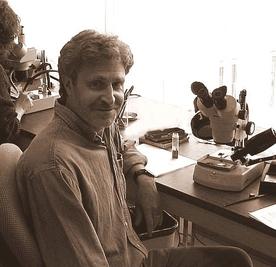Article begins

Image description: A man with short hair wearing a long-sleeved, button-down shirt sits at a desk and smiles.
Caption: Steven Alec Weber sitting in his laboratory at Washington State University.
1954–2020
Steven Alec Weber passed away quietly, surrounded by family on January 14, 2020, from ALS, a disease he lived with for several years that he once described to me as a “new life experience.” That characterization of a crippling disease accurately reflects Weber’s upbeat personality. Not one to be overwhelmed or depressed by his condition, he embraced it and lived with it to the end, making the most of the time he had left.
Weber was born in San Francisco on March 4, 1954, and raised in Orinda, California. His interest in archaeology was piqued in 1969 by a year-long stay in Turkey with his family, visiting numerous archaeological sites. After graduating from Miramonte High School in 1972, he entered the Anthropology Department at Northern Arizona University (NAU) in 1973, graduating with his BA in 1976. After graduating, he became a crew member for field surveys directed by contract archaeology offices at NAU and the Museum of Northern Arizona. By 1977, he was working for the Arizona State Museum on various survey and excavation projects; then he was hired by Peter Pilles at the US Forest Service, Coconino County, in March 1978, where we first met. Over the summer and fall 1978, Weber developed a strong interest in ethnobotany and palynology and began working toward a master’s degree in the lab of Richard Hevly at NAU to extract pollen from archaeological soil samples, including those we had collected that summer at Elden Pueblo.
In summer 1979, Weber went to Shasta-Trinity National Forest to be an archaeological technician for the McCloud District, California, where he completed surveys, wrote reports, and developed sampling designs for surveys and excavations. During that summer he lost his spleen, and very nearly his life, when an illegally passing logging truck smashed into the driver’s side of his car. He continued his master’s research that fall, graduating in July 1981 with a thesis titled “A Palynological Interpretation of the Sinagua and their Changing Environment.”
During this same period, we initiated a business in Flagstaff in 1979 for archaeobotanical and zooarchaeological analyses for contract archaeologists and also established a nonprofit Society of Ethnobiology, with Weber as its first president, in 1981 to continue efforts to bring together ethnobiologists at annual conferences. Weber then left to begin his PhD in anthropology at the University of Pennsylvania in fall 1982. Before he left, he had begun work editing his first book, Havasupai Habitat, co-edited with P. Seaman and was published in 1985.
He completed his PhD in 1989 and began a teaching appointment as a visiting assistant professor at Franklin and Marshall College. In 1994, he was hired as an assistant professor at Washington State University, Vancouver, where he remained for the rest of his career. He was awarded a Fulbright Scholar for research in Pakistan that led to his seminal work on Indus ethnobotany at Harappa. During his career, he published three books, 19 peer-reviewed papers, and numerous book chapters. He served as associate director of the College of Liberal Arts (2005–2006), director of research and graduate education (2006–2007), and associate chair of anthropology (2008–2012). In 2017 he was recognized as a Distinguished Ethnobiologist by the Society of Ethnobiology at the 40th Annual Meeting. Also in 2017 a special symposium was held in his honor at the Annual Meeting of the Society of American Archaeology where many of his former students contributed papers. A special issue of the Journal of Ethnobiology was dedicated in his honor in 2018.
Until his death, Weber remained active in his research and department and never wavered in his dedication to his students. In October 2019, when seriously ill, he made the effort to attend the defense of his last PhD student at the WSU campus. He has publications that are currently in press while others will be submitted by co-authors in the near future. A fund in his memory has been established by the Society of Ethnobiology.
(Steven D. Emslie)
Cite as: Emslie, Steven D. 2020. “Steven Alec Weber.” Anthropology News website, June 12, 2020. DOI: 10.1111/AN.1426

